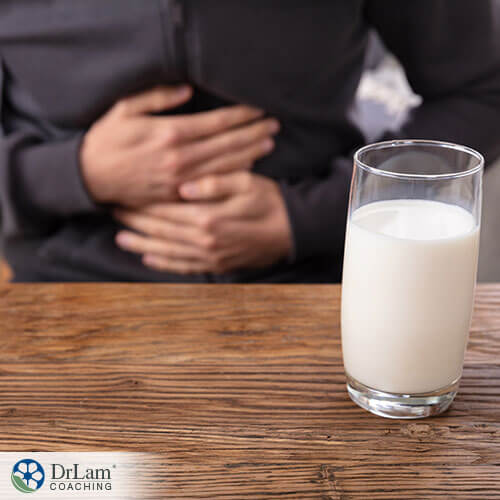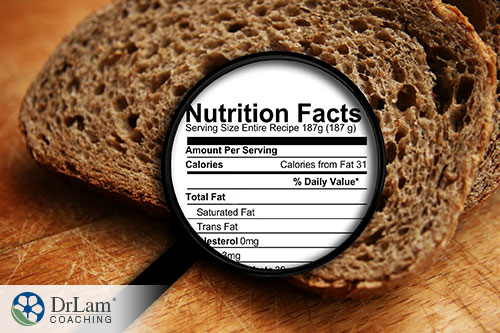Digestive difficulties are a common complaint as well as a common cause of ill health. There are many different types of problems that can cause digestive difficulties including lactose intolerance. This is a condition where the body struggles to digest the main sugar in dairy products. It can cause a range of distressing symptoms that can affect your health and your ability to absorb essential nutrients. If you’re suffering from troubling digestive symptoms, here’s a guide to whether a lactose intolerance diet will help.
 The ability to digest dairy products is essential for infants, but as we grow, more and more people become unable to digest lactose. Around 65 percent of US adults have a reduced ability to digest lactose as they grow up. Lactose is a simple sugar that’s present in all dairy products including milk, yogurt, cheese, butter, whey, curds, and milk by-products. The human body uses an enzyme called lactase to break lactose down into glucose and galactose so that it can be used as energy. When there are low levels of this enzyme in the body, lactose intolerance is the result.
The ability to digest dairy products is essential for infants, but as we grow, more and more people become unable to digest lactose. Around 65 percent of US adults have a reduced ability to digest lactose as they grow up. Lactose is a simple sugar that’s present in all dairy products including milk, yogurt, cheese, butter, whey, curds, and milk by-products. The human body uses an enzyme called lactase to break lactose down into glucose and galactose so that it can be used as energy. When there are low levels of this enzyme in the body, lactose intolerance is the result.
The symptoms of lactose intolerance can be very unpleasant, which is where a lactose intolerance diet comes in.
A lactose intolerance diet does reduce or eliminate foods that cause unpleasant symptoms. You can also eat some dairy in the right ways on this diet, and it can improve digestive health. The lactose intolerance diet doesn’t ban all yogurts as the active cultures in this product help to break down lactose. People who are lactose intolerant usually don’t suffer digestive symptoms from eating certain types of yogurt.
Lactose intolerance isn’t always easy to identify. There are several other conditions and disorders that can cause similar symptoms and problems. It's usually a good idea to see a medical professional to determine if you are lactose intolerant or if your symptoms are caused by something else.
Lactose intolerance can appear at any age, but it is more common in older people. It isn’t an allergy and doesn’t cause the immune system to overreact. As a result, the symptoms of intolerance are usually far less serious than allergy symptoms. However, it may not feel that way at the time. Lactose intolerance usually causes digestive symptoms including:
These symptoms can appear anywhere from 30 minutes to 2 hours after eating. Digestive symptoms are most common, but if you have ongoing intolerance, you may also experience migraines and headaches that last up to two days. This occurs because of undigested food particles that linger in your body long after you’ve last eaten dairy products. This problem may be even worse if you have a leaky gut. The duration of intolerance symptoms will depend on your personal tolerance levels and the amount of dairy you consume.
The lactose intolerance diet is designed to reduce digestive problems caused by the body’s inability to digest lactose. This type of problem is most often caused by low levels of lactase, the enzyme responsible for the breakdown of this simple sugar. Low lactase levels are often caused by:
If you’re trying a lactose intolerance diet, it’s important that you be aware of the potential drawbacks. Milk products contain nutrients such as calcium, vitamin K, magnesium, and vitamin D. So if you’re trying this diet, then you need to beware of possible deficiencies.
Whether you will need to give up dairy entirely will depend on your own level of intolerance. However, it can be a good idea to give up dairy in the early stages so that your system can heal. Once your gut is back to normal, you might reintroduce small amounts of dairy slowly if you want to.
Others recommend keeping small amounts of dairy in your diet if you are mildly lactose intolerant, especially in the case of children. The idea is that this will help your gut build up the bacteria it needs to digest lactose.
Some studies suggest that people who are lactose intolerant can try having up to 12 grams of lactose without consequences. This is the amount of lactose in a glass of milk. There is less lactose in hard cheese and yogurt.
Some more guidelines for a lactose intolerance diet are:
 It isn’t enough to just avoid milk. You need to check the labels on everything you eat to avoid dairy derivatives in common foods. Bread, crackers, soups, cereals, processed meats, pastries, candy, and protein bars can all contain dairy products. You should check ingredient labels for:
It isn’t enough to just avoid milk. You need to check the labels on everything you eat to avoid dairy derivatives in common foods. Bread, crackers, soups, cereals, processed meats, pastries, candy, and protein bars can all contain dairy products. You should check ingredient labels for:
If you like milk, then try raw goat or cow milk that has been fermented for at least 24 hours. This milk is better for your body as pasteurization reduces levels of vitamins A, B, C, and E. It also reduces the amount of iron, zinc, and calcium in the milk. These processes also destroy the natural enzymes that help the body digest milk along with the protein and immunoglobulins.
Just be careful when you drink raw milk as it has been known to cause illness. However, 10 million Americans drink raw milk, and it’s responsible for fewer than 50 cases of foodborne illness, so the risks aren’t really that high.
Supplementing can be an important part of the lactose intolerance diet. When you have lactose intolerance, your body doesn’t have enough lactase, which impedes digestion. You can supplement with this enzyme at the beginning of every meal to aid digestion. However, be careful when you supplement as the long-term effects aren’t fully understood.
Fermenting improves dairy digestibility and also promotes better overall digestion due to the high quantity of probiotics. Kefir and yogurt are examples of fermented dairy. Fermented products are also full of nutrients.
Probiotics are an essential part of a lactose intolerance diet. They help to improve digestion and increase the level of good bacteria in your gut. This will help heal your gut and promote better nutrient absorption, which will improve your health overall. If you don’t like taking tablets, then eat more foods that are high in probiotics such as yogurt, kimchi, kombucha, kefir, or Sauerkraut.
Deficiencies in these nutrients are very common when you are lactose intolerant. This could affect your health overall, increase your susceptibility to osteoporosis, and lead to poor brain and heart health. By increasing your intake of foods that are rich in these nutrients as part of the lactose intolerance diet you will start to correct these issues.
Drinking bone broth has been shown to reduce intolerance and food sensitivities. It’s also a key source of vitamins and minerals that you may be lacking. Make sure you use organic, free-range chicken or beef in your broth for the best effects.
Replacing cooking oil with coconut oil can have several health benefits. It improves digestion, kills bad bacteria and fungus, burns fat, boosts the immune system, and reduces inflammation.
 Stress is a common cause of lactose intolerance and the digestive issues that lead to it. In the world today, stress is such a common experience, along with its effects, like adrenal fatigue, that it is important to consider how it relates to digestive issues overall.
Stress is a common cause of lactose intolerance and the digestive issues that lead to it. In the world today, stress is such a common experience, along with its effects, like adrenal fatigue, that it is important to consider how it relates to digestive issues overall.
Your adrenal glands are an important part of the NeuroEndoMetabolic (NEM) Stress Response, the system that activates when you’re under stress. This system is essential for protecting your body from stress and for reacting appropriately to stress. But when the NEM stress response is active over long periods, like it is when your stress is chronic and ongoing, your entire system can be put out of balance and start to malfunction. This often starts in the adrenal glands, which can start to decompensate from the overwork. When they struggle to keep up with the demand for cortisol, it can result in Adrenal Fatigue Syndrome (AFS) and a combination of troubling and worsening symptoms.
When you have AFS, it’s important to eliminate sources of stress. This will lower your body’s demand for cortisol, known as the stress hormone, and allow your adrenal glands to heal.
Many of us have a range of stressors in our lives. These can include everything from a poor diet, contentious relationships, environmental toxins, and health problems to work or financial pressures. When the NEM stress response is functioning normally, it protects your body from the negative effects of these stressors. But when it’s malfunctioning, the problems start to build and can cause even more stress.
Digestive problems because of lactose intolerance can be a key cause of stress. It can cause pain, discomfort, and other troubling symptoms that irritate and distract you. It may also cause nutritional deficiencies or malabsorption of nutrients. And this can be very serious as your body requires certain nutrients to heal.
The lactose intolerance diet may be able to help with these issues by alleviating symptoms and helping correct imbalances. And this will not only help heal AFS, but it will also benefit the health of your inflammation circuit as well.
The symptoms associated with lactose intolerance can also cause inflammation, which is managed by your Inflammation circuit.
This is the organ system in your body that is designed to remove toxins, pathogens, and other substances that may harm your system. It's made up of the immune system, the gut, and the microbiome. These three systems work together to keep you healthy.
When you have AFS, this natural balance is lost, and inflammation starts to build up in your system, causing damage rather than protecting your body. The three systems in this circuit are interconnected, so when one malfunctions, the others go out of balance as well.
 Lactose intolerance can cause a range of digestive symptoms and problems. It encourages malabsorption of nutrients, the overgrowth of bad bacteria, and general ill-health in the gut and the microbiome. The symptoms and problems that result will naturally increase the activity of the immune system, which will create inflammation to expel the cause of the problems.
Lactose intolerance can cause a range of digestive symptoms and problems. It encourages malabsorption of nutrients, the overgrowth of bad bacteria, and general ill-health in the gut and the microbiome. The symptoms and problems that result will naturally increase the activity of the immune system, which will create inflammation to expel the cause of the problems.
If you’re eating large quantities of dairy products, it could make this cycle worse. Inflammation will become chronic in response to the lactose intolerance and start to damage other systems and further unbalance the Inflammation circuit. The lactose intolerance diet can be a good way to stop this cycle of pain, discomfort, and ill health and start moving towards a healthier way of eating.
To avoid aggravating digestive issues, it’s important that you address as many causes of stress as possible. Digestive problems can also be a key cause of stress for many AFS sufferers. These issues are often caused by a poor diet, but there can also be deeper causes. If you suffer from digestive problems and eat a lot of dairy, then it’s worth trying the lactose intolerance diet. This could be a simple and easy way to eliminate digestive problems and improve your AFS at the same time.
© Copyright 2020 Michael Lam, M.D. All Rights Reserved.
When you suffer from lactose intolerance, your body struggles to break down lactose, which is found in dairy products. This can cause a lot of pain and discomfort, which is why many people are making the change to a lactose intolerance diet for the sake of their health.
